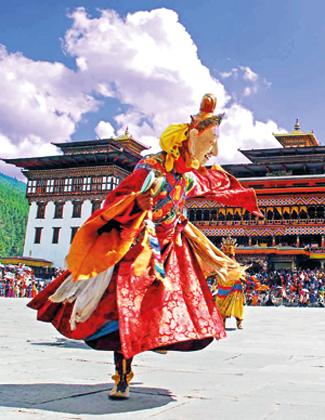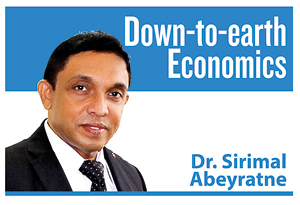Sri Lankans, are you happy?
View(s):
File picture of a celebration in Bhutan
Sri Lankans are said to often have a smile on their faces, probably by default. But, does it mean that they are happy? Even if Sri Lankans are not rich enough as a nation, someone could argue that “money is not happiness”. Of course, even without money someone can be happy too. Nevertheless, lack of money which is poverty does not add anything to happiness either. Obviously, it may add to sorrow and misery. Money is not happiness, but when you live in a modern society money would add many ingredients to your life to keep you happy.
“Money” is only a measurement of wealth and a medium of exchange so that actually it is not money per se that we are looking at. If it is money, it is not a difficult task for the government or rather the Central Bank to keep printing money for people, get everybody out of poverty and make everyone rich. But no country would dare to do that! It is because money is income, and income comes from working, and working adds to production. Of course, someone can receive money even by winning a lottery, or getting a commission from a deal, or even by robbing another. In all these cases, it is only a transfer of someone’s money to another’s hand without adding anything to the wealth of the nation.
Happiness in Bhutan
Whenever we talk about the happiness of a nation, we cannot ignore its association with one country in the world – Bhutan, and its well-known Gross National Happiness (GNH) Index. Bhutan is a landlocked, mountainous country in South Asia, bordered by the two largest countries in the world – China and India. It has a small economy less than US$2.5 billion in size and a small population less than 800,000 people with per capita income less than $3,500.
Apart from the GNH Index, the name of Bhutan is also well-known as one of the “least-corrupted” countries in the world. According to the Corruption Perception Index of 180 countries in the world, while Sri Lanka is ranked at 93rd position, Bhutan remains at 25th position. While countries which are better than Bhutan are all rich countries, the only Asian countries in this group are Singapore, Hong Kong and Japan.
National happiness was adopted as the goal of the government of Bhutan in the Constitution enacted in 2008. This concept of ‘gross national happiness’ is often attributed to a statement made by the fourth King of Bhutan, Jigme Singye Wangchuck in 1972, even though the origin of the concept has been a disputed matter. However, the King is said to have declared that “gross national happiness is more important than gross domestic product”.
The first GNH Index was estimated by Bhutan in 2008 using multiple aspects of wellbeing which includes measures of living standards, health, education, good governance, ecological diversity, culture and psychological wellbeing. After the UN declared a holistic approach to development, as proposed by Bhutan in 2011, happiness and wellbeing of a nation became a globally adopted concept.
World happiness ranking
The World Happiness Report 2020 ranks 153 countries according to the level of happiness of the citizens as they perceive it by themselves. The happiness index considers eight indicators that are assumed to determine the wellbeing and happiness of citizens of a country. The first is, of course, GDP per capita which explains the wealth or the purchasing power of a nation. The second is the life expectancy at birth which denotes health standards of the nation. While GDP per capita and life expectancy are “averages” for a country, the rest of the measures are based on individual responses to a set of simple questions.
The third is, therefore, termed as social support: The national average is based on individual responses to the question “if you were in trouble, do you have relatives or friends you can count on to help you whenever you need them?” The fourth is the freedom to make life choices: The national average is based on the individual responses to the question “are you satisfied with your freedom to choose what you do with your life?”
The fifth is the generosity attitude of the people: The question posed for responses is “have you donated money to a charity in the last month?” The sixth is corruption perception: There are two questions posed to individuals – “is corruption widespread throughout the government?” and “is corruption widespread within businesses?”
The seventh is known as “positive affect” to measure whether the respondents had feelings to laugh and enjoy in the previous day. The eighth question is its opposite, known as “negative affect” to measure whether the respondents felt worry, sadness, and anger in the previous day.
Happy and unhappy nations
Happiness that does not depend necessarily on money is further confirmed by the findings on national happiness. There are 17 “happiest” nations in the world, while this group include mostly the Scandinavian countries and some of the Western European countries. They all score well in the areas of “objective” indicators such as GDP per capita and life expectancy as well as other “subjective” indicators. The top-10 happiest nations in the world are Finland, Denmark, Switzerland, Iceland, Norway, Netherlands, Sweden, New Zealand, Austria, and Luxembourg.
 The second category of countries which is considered as “mostly happy” includes mainly the upper-middle income countries in Latin America along with some of the high-income countries such as the US and some Western European countries. From the Asian region, this category includes only three countries – Taiwan, Singapore and the Philippines.
The second category of countries which is considered as “mostly happy” includes mainly the upper-middle income countries in Latin America along with some of the high-income countries such as the US and some Western European countries. From the Asian region, this category includes only three countries – Taiwan, Singapore and the Philippines.
The third category is “moderately happy”, which is a large mix group of both rich and developing countries. The rich countries such as South Korea, Japan, and Hong Kong are also in this group together with some developing countries such as Pakistan, Ivory Coast, Benin, Congo, as well as Maldives and Nepal from South Asia. The rest of the nations are either “less-happy” or “unhappy” nations. There are no rich countries in these two categories, indicating that money is also important for happiness.
Is Sri Lanka happy?
Having the ranking position as 130th out of 153 nations, interestingly Sri Lanka is a “less-happy” nation. Being a lower-middle income country, Sri Lanka is not a rich nation. In the case of objective indicators – GDP per capita and life expectancy, as well as in social support, Sri Lanka scores moderately. In all other indicators of perception – i.e. freedom to make life choices, generosity, corruption perception, positive affect (laugh, enjoyment), negative aspect (worry, sadness, and anger), Sri Lanka’s score is poor.
Countries which are comparable with Sri Lanka in terms of the nations’ happiness are mostly the African countries: Uganda, Chad, Tunisia, and Mauritania remain just above Sri Lanka, while those which are just below Sri Lanka are Congo, Swaziland, Comoros, Togo, and Ethiopia as well as Myanmar from Asia. You might wonder, where the other South Asian countries are. Bangladesh is still above Sri Lanka having the 107th ranking position. India with 144 ranking position is one of the last few “unhappy” nations. Being the last on the list, Afghanistan is the “most unhappy” nation in the world. By the way, Bhutan is not in the list.
What it all says is a very simple reality; there is a much better world than what we used to live in. Someone could oppose the findings of the World Happiness Report on various grounds. But I believe what is more important is to scrutinize our own status for the sake of our own genuine understanding.
(The writer is a Professor of Economics at the University of Colombo and can be reached at sirimal@econ.cmb.ac.lk and follow on Twitter @SirimalAshoka). 


